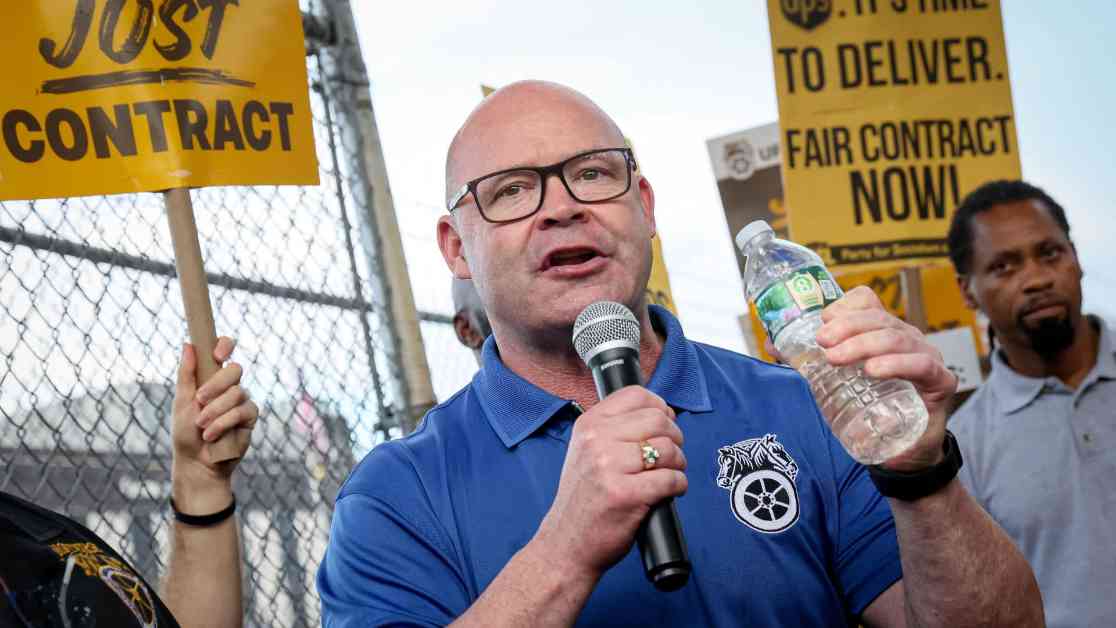Teamsters Union Opts Not to Endorse Harris or Trump in 2024 Election
The International Brotherhood of Teamsters, one of the largest labor unions in the United States, made a significant announcement on Wednesday regarding the upcoming 2024 presidential election. After months of speculation and anticipation, the union’s general executive board declared that they would not be formally endorsing either Democrat Kamala Harris or Republican Donald Trump for the presidency.
This decision marks a departure from the Teamsters’ long-standing tradition of backing Democratic candidates in national elections. The union’s president, Sean O’Brien, explained the rationale behind the non-endorsement, citing a lack of significant commitments from both Harris and Trump to prioritize the interests of working people over corporate entities.
Member Polling Reveals Divided Support
The Teamsters’ decision not to endorse a candidate was informed by member polling that showed a lack of majority support for Harris and no universal backing for Trump. Despite both candidates engaging in face-to-face discussions with union members during roundtable sessions, neither was able to make substantial commitments to address the union’s key concerns.
“We sought commitments from both Trump and Harris not to interfere in critical union campaigns or core Teamsters industries, and to honor our members’ right to strike, but were unable to secure those pledges,” stated O’Brien in the official statement released by the union.
Shift in Member Preferences
A national survey of Teamsters members conducted after a presidential debate revealed a significant shift in preferences among the union’s rank-and-file. While Biden was still the Democratic nominee, union members favored him over Trump. However, following the debate, Trump garnered support from 58% of Teamsters, compared to Harris’ 31%.
This change in sentiment reflects the dynamic nature of political alliances within the labor movement and underscores the importance of candidates’ engagement with union members on key issues affecting working-class Americans.
Implications for the 2024 Election
The Teamsters’ decision not to endorse Harris or Trump in the upcoming election carries significant implications for both candidates’ campaigns. While Harris has secured endorsements from several other labor unions and enjoys strong support within the Democratic Party, the absence of the Teamsters’ backing represents a notable setback.
On the other hand, Trump’s campaign has highlighted the union’s member survey results as a testament to his appeal among working-class voters. The lack of a formal endorsement from the Teamsters may not necessarily hinder his reelection efforts, but it does underscore the complexities of securing support from diverse labor constituencies.
In response to the union’s decision, Harris’ campaign spokesperson emphasized the Vice President’s longstanding commitment to labor rights and reiterated her dedication to representing the interests of union members if elected to office. The Teamsters’ non-endorsement underscores the challenges facing candidates in navigating the diverse landscape of organized labor in the lead-up to the 2024 election.
As the political landscape continues to evolve, the Teamsters’ decision serves as a reminder of the importance of engaging with diverse constituencies and addressing the concerns of working-class Americans in shaping the future of the country’s leadership. The union’s non-endorsement reflects a broader trend of shifting alliances and priorities within the labor movement, highlighting the complexities of navigating political relationships in a rapidly changing world.

















